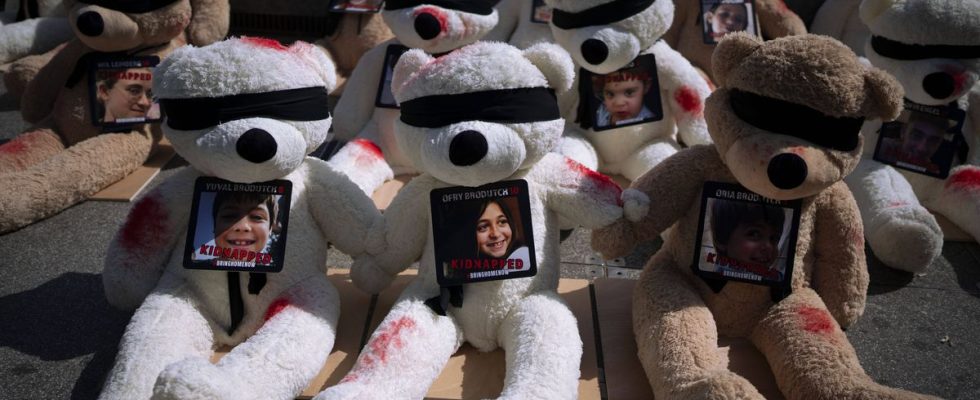The announcement surprised everyone, even the Quai d’Orsay. During the joint press conference with Benjamin Netanyahu held Tuesday in Jerusalem, Emmanuel Macron affirmed that “France [était] ready for the international coalition against Daesh, within which we are engaged for our operation in Iraq and Syria, to also fight against Hamas.” “I propose to our international partners that we can build a regional and international coalition to fight against the terrorist groups that threaten us all,” continued the French president.
What could the training proposed by the French president look like? Is it even feasible? Could it be effective? Answers with Pierre-Jean Luizard, research director at CNRS, historian of Islam in the Middle East and author Roots of Chaos (Tallandier).
What could this international coalition look like?
Developed at the Elysée, notably by political-military advisor Xavier Chatel, according to The world, the idea was clarified by the presidential palace. “We are available to increase what we do in the coalition against ISIS [Etat islamique], depending on what Israel asks of us, has thus nuanced the Elysée. The coalition against ISIS is the benchmark: a coalition of the willing, in the form of political or military support. Sixty countries, of which only three have deployed forces on the ground: the United States, the United Kingdom and France, with Germany on the technical level. »
It would therefore be a coalition “on the model” of that formed in 2014 to fight against Daesh and led by the United States but “in a very different context”, underlines Pierre-Jean Luizard. In the coalition against Daesh, Washington and Tehran, or at least the pro-Iranian Iraqi militias, have in fact entered into an “unacknowledged alliance to wage war” against the jihadist group, recalls the researcher. An unimaginable possibility in the context of the war between Hamas and Israel, the Jewish state being the sworn enemy of Iran.
What could its role be?
Emmanuel Macron also provided some details after his meeting with the Egyptian president on Wednesday. The role of this coalition would be to “better target the terrorists we are attacking, exchange information with partners, be more precise and spare civilians,” he declared to the press.
“Should it be the same, should we transform it? Let’s not get into legal constraints today. She exists. Perhaps the same States do not want to do the same thing but in any case we have this experience of cooperation which has enabled the region to fight effectively against terrorist groups and which we are continuing,” he said. he still pleaded. The president would thus like to use the “experience” of the anti-Daesh coalition to build one “with all the States which are ready to help fight against terrorist groups including Hamas, to share information, to identify these terrorists and neutralize them.
Could it be effective?
The international coalition against Daesh was tasked with destroying the terrorist group based in Syria and Iraq. “This territorial dimension of the mission is successful,” notes Pierre-Jean Luizard. On the other hand, the terrorist group and its ideology have persisted ever since. As proof, the attacks which recently affected France and Belgium, claimed by the terrorist organization. A failure due to the lack of “necessary political solution to eliminate Daesh”, explains the researcher who recalls that “the threat” of seeing the Islamic State once again establish a territory “still exists” because “the context which explained its success in Iraq in 2014 is still in place.
There is little chance that such a coalition would succeed, in the same way, in putting an end to a group like Hamas. As a general rule, “all international coalitions formed against jihadist movements ultimately had an effect contrary to the desired goal,” summarizes Pierre-Jean Luizard.
Daesh and Hamas, same fight?
Benjamin Netanyahu repeated it on Tuesday: Israel considers Hamas equal to Daesh, representing the same threat to the world, affirming that Hamas “is not the Islamic State thousands of kilometers from Europe. It’s the Islamic State in the suburbs of Paris.” However, this comparison is questioned by many specialists, notably Pierre-Jean Luizard for whom the two groups “are not comparable”.
“IS wanted to erase the borders, while Hamas wants to create them to create a Palestinian state,” he explains. Despite a “Daeshization of the modus operandi of the Palestinian group during its attack in Israel [le 7 octobre dernier], it is new and due to the state of despair of the Palestinians in the face of a blocked peace process which condemns them to a hellish life,” he continues. Emmanuel Macron also clearly distinguished the two armed groups, affirming that Hamas “is different from Daesh, I do not make an equivalence, but it is a terrorist group. »
What risks could this coalition generate?
Against the Islamic State, “there was not the risk that a coalition against Hamas would represent of internationalizing the conflict, this coalition would have made France and the other participating countries appear as direct allies of Israel and enemies Arab countries” and in particular through a “land intervention by French soldiers in the Gaza Strip”, warns Pierre-Jean Luizard. Emmanuel Macron, on this last point, assured Wednesday that it was “not at all planned to send French soldiers to the Gaza Strip. »
The proposal, much criticized by specialists, could “increase divisions and aggravate mutual hatred by dragging us into a war that should not be ours”, concludes Pierre-Jean Luizard about this idea.

